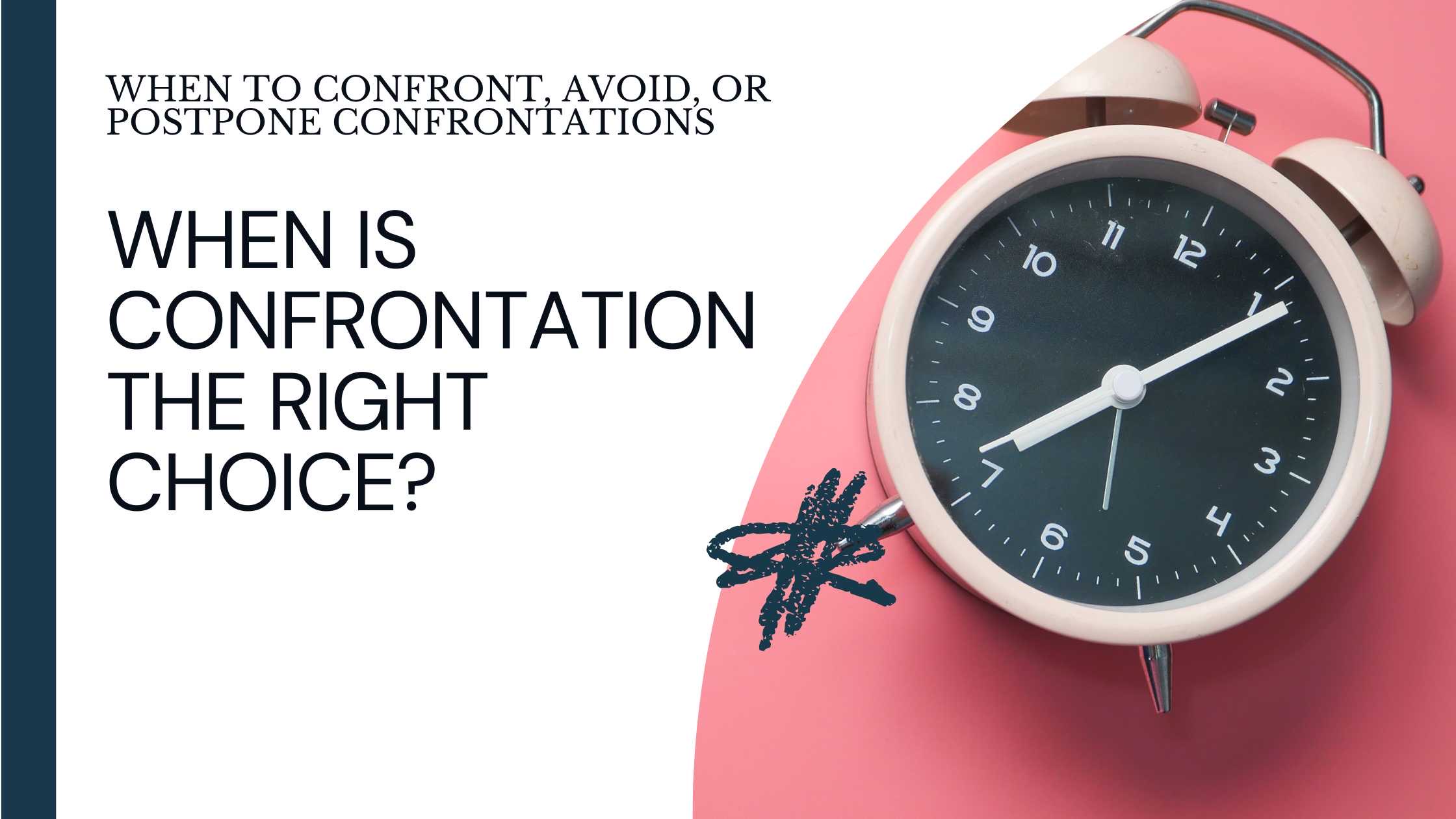In our three-part series on when to avoid, postpone, or confront, we are left with when we should have the confrontation!
We know that sometimes avoiding the confrontation is the right choice, and sometimes postponing the conversation is the smartest thing to do, but when do we choose the third option and have the conversation right here and right now?
Check out my previous articles here: https://on-the-right-track.com/blog/ to see when to avoid and when to postpone.
When we avoid or postpone, it isn’t the time to have the confrontation. And having the confrontation after postponing it gives you time to prepare. Are there times when you shouldn’t take the time to prepare and jump in headfirst?
Yes.
- Look at the consequences of postponing. While postponing is the correct answer in many situations, what are the consequences of not having the confrontation on the spot? Sometimes, postponing the confrontation is giving the other permission to do or say what they are doing. If the consequences for postponing don’t make sense, have the confrontation on the spot.
Years ago, a participant in one of my workshops shared her experience. Her manager was very anti-cell phone at work and vocal about it. Jenny felt her manager was overpowering and didn’t want to hear any excuse or justification for needing her cell phone handy. She wouldn’t win the discussion, so she never bothered to have it.
Including the time that her mother had suffered a heart attack and was in the hospital. She hadn’t mentioned anything to her manager about it (they didn’t have that type of relationship), but she did have her cell phone on and on her desk as they were waiting for updates from the hospital.
It rang. It was not loud but rang while the manager walked by her cubicle. He lost his temper, picked up her cell phone, and stomped on it, destroying it!
I am not making this up. Yes, his behavior was beyond inexcusable. In a situation like this, Jenny had no choice but to say something at that moment. She was emotional and unprepared, but this was not a time to postpone. Some of the conversation could have been postponed, but the initial confrontation could not.
She did say something. She told him he needed to buy her a new cell phone as he had no right to destroy hers. She didn’t tell him about her mother nor justify why her phone was on at work, but she did identify that his actions were not okay with her and said what she needed to say.
You can be sure that this situation would require a follow-up conversation/confrontation, but at the moment, she had to say something to indicate this was unacceptable. The consequences of saying nothing at the moment were too high. They implied his actions were correct and she was in the wrong.
- The timing is in your favor. Sometimes, the timing makes sense to have the confrontation without giving yourself time to prepare.
Imagine you walk into a group of colleagues without them seeing you approach. They are talking about you, and you can hear them! You shouldn’t ignore it or postpone the confrontation in such a situation. The timing demands you say and do something on the spot. It doesn’t have to be much, but you do need to identify what you interrupted.
You may choose to have individual follow-up conversations with each colleague later, but at the moment, you must address what you just heard. The timing is forcing your hand.
- Safety or Compliance. Some things need to be done a certain way, even if others don’t agree with it.
You can imagine that if someone is doing something unsafe or not compliant at work, you can’t bring it up later, nor can you avoid it. You may need a conversation/confrontation to get them to do things correctly.
It’s important to say that just because you don’t like something a certain way doesn’t mean you should confront it, but if it is the rules at work, you should say something.
I was in a ride-share recently, where texting and driving was illegal. The driver proceeded to start to text while we were driving. This was an example of a time when I needed to be confrontational. I nicely told him that I was uncomfortable when he texted while driving. In his defense, he apologized and stopped.
If I had ignored it, I would have been angry with myself for not speaking up. If I had waited until the end of the ride or put it in his comments, I would still be angry with myself. The timing was right, and it was a safety and compliance issue.
We all want to have confrontations when we are prepared, in control of our emotions, and away from the public eye. That isn’t always possible.










